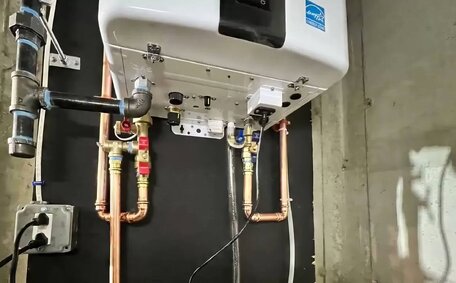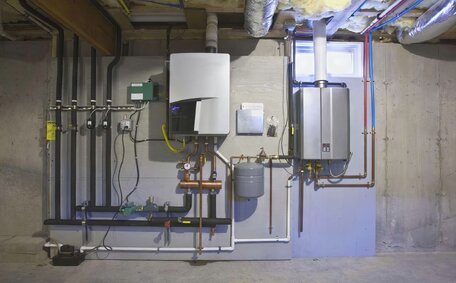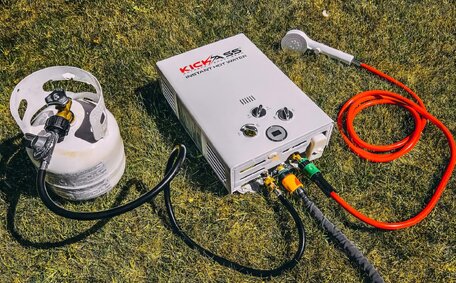What Causes Low Water Pressure in Homes?
Several factors commonly contribute to low water pressure in homes:
- Corroded or damaged interior piping reducing flow - Old galvanised steel or copper pipes can corrode and accumulate mineral deposits over time, narrowing the pipe diameter.
- Partially blocked pipes due to buildup or obstructions - Things like sediment, rust flakes, and mineral deposits can collect over the years and restrict water flow.
- Tree roots infiltrating and crushing external drain pipes - Roots from nearby trees may make their way into your damaged pipework, obstructing flow.
- Undersized piping struggling to meet household demand - If there are not enough or large enough pipes, pressure drops when multiple taps are in use.
- Friction from bends and internal corrosion can reduce water pressure - The rough surfaces and irregular piping shapes contribute to increased friction loss.
- Failing water pressure regulator causing abnormal restriction - Malfunctioning regulators can limit incoming water pressure.
Low water pressure issues often deteriorate over time, impacting both hot water systems and overall plumbing functionality. As hot water heaters age, the likelihood of experiencing flow issues increases. However, early detection and rectification with pipe relining can effectively restore optimal water pressure.
How Pipe Damage Contributes to Pressure Loss
Pipe damage is a significant factor contributing to low water pressure in residences. Corrosion, deterioration, or blockages in pipes reduce the capacity for unimpeded water flow. Here are some ways pipe damage causes pressure loss:
- Corrosion and mineral buildup narrows the inside diameter of pipes, increasing friction against water flow.
- Cracks and leaks allow water to escape the closed system, decreasing overall pressure.
- Directly hampering water flow are the partial or complete blockages in pipes, which are the culprits behind those dreaded blocked drains.
- Collapsed and misshapen pipes brought on by external stresses substantially lower flow.
- Holes from tree roots entering pipes reduces the section available for unimpeded water passage.
As damaged pipes become rougher and more obstructed, the water supply must work harder to maintain flow. This strain on the system leads to pressure gradually dropping at all outlets until your water pressure issues are restored with trenchless pipe relining solutions.
Introducing Pipe Relining as an Innovative Solution
Pipe relining is a non-intrusive, trenchless solution that effectively revitalises water pressure, addressing issues in compromised drains and plumbing systems. This method revitalises plumbing by inserting a new lining inside the existing pipe, effectively creating a 'pipe within a pipe’ system.
Unlike traditional pipe replacement methods which require extensive property excavation and landscaping disruption, Pipe relining permits the in-situ restoration of pipes without the need for excavation.
Tiny entryways are carved into the soil at the extremities of the pipe route to introduce the flexible lining, a move to promptly ensure those troublesome leaky pipes get relined by inflating and curing the material with steam or hot water.
The epoxy or polyurethane relining forms a lasting barrier within the pipe that seals and waterproofs your home’s plumbing system, effectively restoring water flow. It also smoothes out internal abrasions and blockages that restrict water flow. This restorative pipework process, where pipe relining can save you from the cost or mess of laying new pipes, often helps re-establish normal household water pressure.
If you’re facing low water pressure issues despite having functional taps and appliances, non-destructive pipe relining could be the ideal solution before resorting to extensive pipe replacement.
Understanding The Pipe Relining Process
In Sydney, pipe relining follows a straightforward process to restore damaged pipes without the need for excavation:
- Technicians access your pipes by carefully creating small openings through concrete or drywall at strategic locations.
- A camera is fed through the pipework to inspect and measure the scope of damage or defects present.
- Lengths of impregnated liner material are then saturated with a two-part epoxy or polyurethane resin.
- Sections of liner are introduced into the affected pipes and then expanded with water or air pressure to adhere tightly to the internal pipe surfaces under your home.
- Pipe relining quickly proves its effectiveness as resins are activated by hot water or steam typically within a day, a stark contrast to the time-consuming nature of traditional methods. Temperature monitoring is a critical part of this process.
- Finally, the area is cleaned up, the resin-hardened liners are cooled and cut at entry points to remove installation equipment before the access pits are sealed and surface reinstated with durable quick-setting cement.
The hardened liners effectively rehabilitate drain pipes, creating a smooth, jointless new pipe within the old one, counteracting water pressure loss. Eliminating joints not only prevents future root intrusions, it ensures your new hot water pipes stay reliable for decades.
Restoring Water Flow Efficiency
Pipe relining services in Sydney are notably effective at restoring water flow efficiency by smoothing pipe interiors, which in turn eliminates obstructions that cause turbulence or friction. The seamless epoxy or polyurethane barrier lining can save aged pipes from corrosion while enhancing flow capacity.
Addressing the causes of pressure loss in drainage pipes, such as buildup, cracks, and blockages, can substantially improve your hydraulic capacity. Water can glide effortlessly, no longer encumbered by the constriction that can cause unbalance in pressure across all taps and outlets.
Rather than just masking pressure problems your system may face with stopgap solutions like regulator tweaks, relined pipes provide a long-term renewal of the entire water delivery infrastructure. The expected service life of 50 years or more means drastically reduced maintenance, superior flow efficiency and reliable water pressure compared to deteriorating original plumbing pipes.
Pipe relining is recommended because it enables older plumbing systems to meet modern water demands effortlessly, with no noticeable pressure drops during peak usage. Baths brim swiftly, our hot water heater operates with heightened efficiency, and garden irrigation systems run consistently without sputters. Essentially, everything functions as it should thanks to the revitalised water flow capabilities from restored pipes.
Key Benefits of Pipe Relining Over Replacement
Pipe relining boasts several compelling advantages over complete pipe replacement:
- When considering pipe relining cost, it’s far less expensive and remarkably cost effective, offering significant savings, around 30-50% less than traditional pipe replacement costs.
- It’s less invasive, requiring only small access pits as opposed to large trenches.
- The project duration is shorter, with pipe relining completed in 1-2 days as opposed to the 1-2 weeks required for traditional replacement.
- No landscaping destruction - Guarding your gardens and structures against damage underscores our commitment to get the job done promptly, ensuring tranquillity post-restoration.
- Highly durable - Brawoliner epoxy liners last 50+ years.
- Improved water flow - A smooth surface within the interiors increase pressure and volume.
- Added pipe strength - Liner provides a protective pipe-within-a-pipe.
- Environmentally friendly - Produces less waste compared to traditional methods.
- Prevents future root damage - With no joints for roots to enter.
- It maintains property value by avoiding significant damage from pipe works.
Pipe relining, with its benefits, delivers superior outcomes for sewer pipes, leading to minimal disruption, quicker project completion, and significant cost savings.
What Factors Determine If Pipe Relining Is Right for You?
Pipe relining offers an effective solution for numerous common plumbing issues in homes, with key factors determining its suitability and recommendation by plumbers:
- Presence of internal corrosion and wear in cast iron, copper or galvanised plumbing pipes
- Persistent blockages from mineral deposits or partial obstructions
- Tree root intrusion evident within sewer line joints or cracks
- Locations where excavation disruption is highly problematic e.g. under buildings, gardens or driveways
- Drops in household water pressure and sewer storm water flow capacity indicating internal pipe issues
- Multiple leaks or defects along a pipe run making spot repairs inefficient and temporary
Where traditional pipe replacement is impractical, relining offers a non-invasive solution that protects the environment. It also provides a 50+ year pipework life expectancy using seamless epoxy barriers immune to future root damage or corrosion.
An experienced plumber will assess the damaged pipework to see if structural relining is suitable, considering its merits over other repair options. A few access points confirm the scope of damage and suitability for lining. From there, what pipe requires attention is identified, and an exact custom-fitted liner is impregnated with protective resins to revitalise its internal surface.
How Long Pipe Relining Lasts and Ongoing Maintenance
Brawoliner’s pipe relining with epoxy coatings offers extreme durability and corrosion resistance, boasting a service life of over 50 years. After installation, structurally relined pipes require minimal maintenance, with only the need for periodic inspections to guarantee long-lasting performance.
The seamless rigid inner lining forms a permanent watertight seal that withstands harsh water flows while smoothing away internal abrasions and blockages. It remains immune to future root intrusions, mineral buildup, leaks or corrosion, which is very good news for homeowners seeking long-term solutions.
Brawoliner’s unique formulation creates an incredibly hard-wearing structural reinforcement lining that maintains integrity and optimised water flow for decades. Compared to standard pipes needing repairs every 10-15 years, relined pipes operate reliably with no work required thanks to their impenetrable epoxy layer.
When I called to discuss the completed work at my house, the sentiment was unmistakeable—very happy with the rejuvenated pressure, leaks became a distant memory.
Choosing a Professional Pipe Relining Service
Choosing a pipe relining company for your Croydon Park property necessitates picking a service with proven experience and a solid reputation.
Identifying what pipe relining specialists with extensive expertise specifically in the Croydon Park area is crucial. This familiarity with local pipeline systems, soil types, regulations and relining best practises enables optimal solutions tailored to your property’s needs.
Our team at Croydon Park Plumbing consists of friendly, licensed experts specialising in detailed pipe repairs with trenchless Brawoliner technology for local pipeline rehabilitation. With over 50 years of collective experience and industry-leading materials, we provide excellent service, delivering durable solutions that stand the test of time.
We would take pride in being known as very professional, with our focus on efficiency and minimising disruption to properties during pipe repairs. Our no-obligations quote process can help with transparent pricing, making clients eager to use them again, bolstering our standing in the industry. We would be delighted to provide trusted pipe relining services in Croydon Park, so give us call on our team at 1300 349 338 to schedule an appointment today.
Pipe Relining FAQs: Common Concerns Addressed
Below are responses to frequent queries regarding pipe relining:
How long does the pipe relining process take?
The streamlined structural relining process, which we endorse, typically only takes 1-2 days to complete. We highly recommend our techniques, where his team accesses your pipe system via small pits, cleans and inspects the pipes, inserts impregnated resin liners then steam-cures them in place. Minimal digging and no heavy equipment keeps disruption to a minimum.
Can you reline all pipe materials?
We can structurally reline diverse types of piping, whether metallic or non-metallic, such as copper, iron, PVC, and clay. If pipes have completely collapsed we recommend replacement, but if we’re able reline a severely damaged pipe, it becomes a suitable candidate for relining.
How do you reline pipes under driveways or buildings?
We utilise drain relining which requires only small access pits every 30 metres, instead of continuous trenches. This approach lets us get pipe work completed without disrupting your property, in areas like under gardens, driveways or houses by strategically placing access points.
Will I have to vacate my property during relining?
No, as there no major demolition or digging takes place, there’s no disturbance to your home, eliminating the need to vacate the property. We work entirely indoors or in contained outdoor pits, allowing normal access to homes during our pipe restoration process.
How long will pipe relining last compared to replacement?
Structural Brawoliner epoxy liners maintain integrity for over 50 years, safeguarding get your pipes far longer than replaced metal pipes. The seamless barrier coating is immune to corrosion, abrasions, root intrusion and mineral buildup that affects standard piping.






